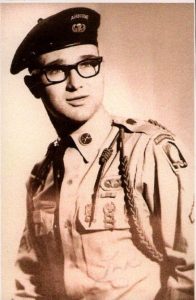UA Little Rock Graduate Tells Untold Story of Arkansas Vietnam Soldier

A graduating student from the University of Arkansas at Little Rock is shining a light on the previously unknown story of a young Arkansas soldier who died fighting for his country during the Vietnam War.
History has long been a favorite topic for Isaac Wolter, who is graduating from UA Little Rock this semester with a master’s degree in public history.
“My dad always took me to museums when I was a kid,” Wolter said. “He would ask me questions from the information panels in the museums. My dad really wanted me to be involved and interested in history. He was in the Air Force so military and aviation history is what I got interested in.”
Wolter has put his love of history to good use for years volunteering and working at museums across Arkansas, including the Cabot School’s Museum of American History, Arkansas Air and Military Museum, Center for Arkansas History and Culture, Jacksonville Museum of Military History, and the Clinton Presidential Library and Museum.
When he discovered a box of unknown artifacts from a Vietnam War soldier while interning at the Jacksonville Museum of Military History, Wolter became intrigued by the story of John Wayne Acosta. He was taking a Museum Applications course with an assignment to create a museum display, and this seemed to be a perfect fit.
“John Wayne Acosta was from Rose City, a suburb of North Little Rock that was annexed in the late 1970s,” Wolter said. “He was born in Virginia and settled with his mother in Rose City in 1963. He completed his junior year at North Little Rock High School, but he enlisted in the Army instead of doing his senior year of high school. He arrived in Vietnam in April 1966 as a machine gun assistant and infantryman and was immediately involved in the U.S. attempt to break the North Vietnamese fighting spirit. He survived his first tour and earned a Purple Heart.”
Acosta’s things were donated to the Jacksonville Museum in 2008 after a house contractor discovered a footlocker hidden behind a wall in the attic where Acosta’s mother used to live. The footlocker held a large assortment of items ranging from children’s toys to Vietnam War era military items.
“He stood out as his own person,” Wolter said. “It really resonated with me as a story I wanted to tell. It amazed me that we held this man’s entire life story, and seemingly no one else knew about the love and ultimate sacrifice he gave for his country.”
After completing his first tour, Acosta came home to Arkansas for just two short months in 1967 before returning to Vietnam.

“Acosta wanted to be a helicopter door gunner,” Wolter explained. “He volunteered to go back to Vietnam, which was rare. While he was there, he was very close to the end of his second tour in 1968 when he was shot down and killed.”
While Acosta has no living relatives left, Wolter was able to interview some of his high school friends and some of the soldiers he served with in Vietnam. Dr. Sam Adkins, who was Acosta’s best friend in high school, was able to provide letters that Acosta wrote to his mother during the war.
“When Acosta’s mother Margaret died in 2007, an aunt gave him Acosta’s letters and said, ‘You should have it since you are his best friend,’” Wolter said. “I wanted Wayne to be the one speaking and to tell his own story through the letters.”
According to Wolter, Acosta was known for his independent nature, sense of style, and caring nature.
“He was his own person and had a really unique personality,” Wolter said. “When he was in Vietnam, he wore his uniforms really clean and had them custom tailored so they would look really good. John Wayne would be cleaning his uniform and polishing his boots when others would go out and drink. He always dressed really nice and wanted to look professional. That drive to be his own person and be the best was infectious. He really was like The Lonely Rebel character that he created. He was an incredible artist. He carried a camera everywhere to take pictures. He wrote letters to his mother every single day.”
Wolter wrote his master’s thesis, “An Arkansas Boy’s Vietnam War: An Exhibition at the Jacksonville Museum of Military History,” about Acosta. The museum exhibition he created opened in March during the museum’s annual Welcome Home Vietnam Veterans event.
